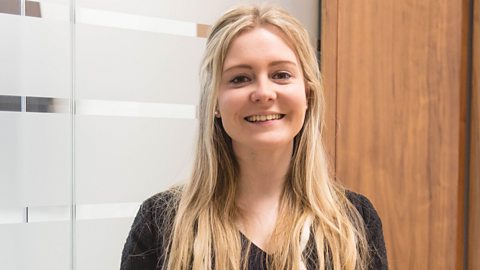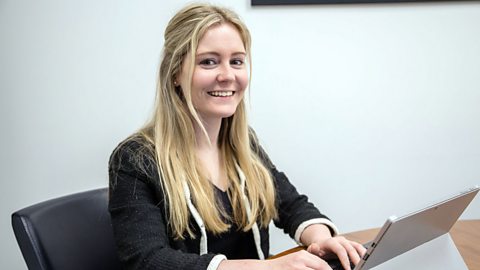Meet Chloe, 23, and find out about her job on a graduate scheme at St. James’s Place Wealth Management. Part of our Bitesize world of work series.

It's my job to help our largest financial advisers to grow their business.
What is your job?
I'm on a rotational graduate scheme, which means I move around different departments learning about different parts of the business. I've completed three six-month rotations so far in HR, Private Clients and the Large and Medium Business Unit. I am currently working with some of the largest financial advice businesses at St James' Place.
My job is quite project-based. Some projects are long, others are short, which means they can often overlap.

Can you explain what skills you use day-to-day?
I use my communication skills every day. Because I work in teams who are working towards the same project, we need to be able to collaborate well too. I also need emotional intelligence because I’m working with people all the time.
I need to be organised because I travel a lot in this job. I studied Business Studies at A-level and I am able to put the theory into practice in this job.
Is this the job you always knew you wanted to do?
No! When I was at school and university, I thought I knew what I wanted to do. Then, after I did a hospitality and Business Management degree, I started applying for jobs, and I was less clear because I didn’t want to go into the industry my degree was in.
I always thought that you needed to be good at Maths to work in the financial sector, which is why I thought it wasn't for me. But in the job I do, I don't really use Maths at all. I didn’t realise the amount of opportunities in financial services.


Top tips
- Be open to change. You might have an idea of what you want to do, but there might be another option you haven't thought about before
- Investigate all opportunities available to you.

In Chloe's graduate scheme, she works closely with financial advisers. This is a career option she can consider when she has finished her rotational programme. Financial advisers help people and organisations to choose investments, savings, pensions, mortgages, and insurance products.
What to expect if you want to be a financial adviser
- Financial adviser average salary: ÂŁ23,500 to ÂŁ45,000 per year
- Financial adviser typical working hours: 35 to 38 hours per week
What qualifications do I need to be a financial adviser?
You could get into this role via a university course, an apprenticeship, or working towards this role. For a degree or higher or degree apprenticeship, you'll usually need A-levels, or equivalent. Alternatives to A-levels include taking a T-level in Finance or Accounting (Level 3, England-only, from Sept 2022), which is equivalent to three A-levels. Check with your course provider which alternative qualifications they accept. To work as a financial adviser, you'll need to be registered as an 'approved person' by the .
Sources: LMI for All, National Careers Service,
This information is a guide and is constantly changing. Please check the for the latest information and all the qualifications needed and the for more on T-levels.
Find out more on the Prospects website about the role of a .
For careers advice in all parts of the UK visit: , , and .


Find work experience placements with Workfinder.
Tips and advice
Help with interviews, writing a CV and all things work experience related.


Damilare: apprentice accountant. video
Damilare left uni and pursued an apprenticeship.

Gemma: secretary
Gemma is doing an apprenticeship at KPMG.

Dina: secondary Maths teacher. video
Dina teaches Maths to 11-18-year-olds.
